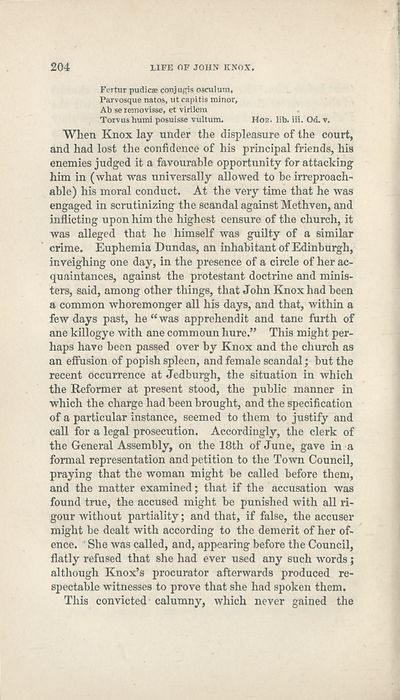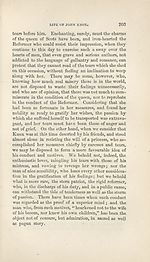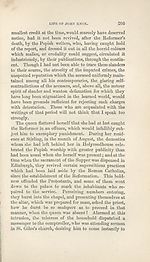Download files
Complete book:
Individual page:
Thumbnail gallery: Grid view | List view

204
OF JOHN KNOX.
Fertur pudicie conjugis osculurn,
Parvosque natos, ut capitis minor.
Ab seremovisse, et virilem
Toi-vus humi posuisse vultum. Hon. lib. iii. Od.».
When Knox lay under the displeasure of the court,
and had lost the confidence of his principal friends, his
enemies judged it a favourable opportunity for attacking
him in (what was universally allowed to be irreproach¬
able) his moral conduct. At the very time that he was
engaged in scrutinizing the scandal against Methven, and
inflicting upon him the highest censure of the church, it
was alleged that he himself was guilty of a similar
crime. Euphemia Dundas, an inhabitant of Edinburgh,
inveighing one day, in the presence of a circle of her ac¬
quaintances, against the protestant doctrine and minis¬
ters, said, among other things, that John Knox had been
a common whoremonger all his days, and that, within a
few days past, he “was apprehendit and tane furth of
ane killogye with ane commoun hure.” This might per¬
haps have been passed over by Knox and the church as
an effusion of popish spleen, and female scandal; but the
recent occurrence at Jedburgh, the situation in which
the Reformer at present stood, the public manner in
which the charge had been brought, and the specification
of a particular instance, seemed to them to justify and
call for a legal prosecution. Accordingly, the clerk of
the General Assembly, on the 18th of June, gave in a
formal representation and petition to the Town Council,
praying that the woman might be called before them,
and the matter examined; that if the accusation was
found true, the accused might be punished with all ri¬
gour without partiality; and that, if false, the accuser
might be dealt with according to the demerit of her of-
ence. She was called, and, appearing before the Council,
flatly refused that she had ever used any such words;
although Knox’s procurator afterwards produced re¬
spectable witnesses to prove that she had spoken them.
This convicted calumny, which never gained the
OF JOHN KNOX.
Fertur pudicie conjugis osculurn,
Parvosque natos, ut capitis minor.
Ab seremovisse, et virilem
Toi-vus humi posuisse vultum. Hon. lib. iii. Od.».
When Knox lay under the displeasure of the court,
and had lost the confidence of his principal friends, his
enemies judged it a favourable opportunity for attacking
him in (what was universally allowed to be irreproach¬
able) his moral conduct. At the very time that he was
engaged in scrutinizing the scandal against Methven, and
inflicting upon him the highest censure of the church, it
was alleged that he himself was guilty of a similar
crime. Euphemia Dundas, an inhabitant of Edinburgh,
inveighing one day, in the presence of a circle of her ac¬
quaintances, against the protestant doctrine and minis¬
ters, said, among other things, that John Knox had been
a common whoremonger all his days, and that, within a
few days past, he “was apprehendit and tane furth of
ane killogye with ane commoun hure.” This might per¬
haps have been passed over by Knox and the church as
an effusion of popish spleen, and female scandal; but the
recent occurrence at Jedburgh, the situation in which
the Reformer at present stood, the public manner in
which the charge had been brought, and the specification
of a particular instance, seemed to them to justify and
call for a legal prosecution. Accordingly, the clerk of
the General Assembly, on the 18th of June, gave in a
formal representation and petition to the Town Council,
praying that the woman might be called before them,
and the matter examined; that if the accusation was
found true, the accused might be punished with all ri¬
gour without partiality; and that, if false, the accuser
might be dealt with according to the demerit of her of-
ence. She was called, and, appearing before the Council,
flatly refused that she had ever used any such words;
although Knox’s procurator afterwards produced re¬
spectable witnesses to prove that she had spoken them.
This convicted calumny, which never gained the
Set display mode to:
![]() Universal Viewer |
Universal Viewer | ![]() Mirador |
Large image | Transcription
Mirador |
Large image | Transcription
| Antiquarian books of Scotland > Scotland/Scots > Life of John Knox ; and, The life of Alexander Henderson > (222) |
|---|
| Permanent URL | https://digital.nls.uk/131834968 |
|---|
| Description | Thousands of printed books from the Antiquarian Books of Scotland collection which dates from 1641 to the 1980s. The collection consists of 14,800 books which were published in Scotland or have a Scottish connection, e.g. through the author, printer or owner. Subjects covered include sport, education, diseases, adventure, occupations, Jacobites, politics and religion. Among the 29 languages represented are English, Gaelic, Italian, French, Russian and Swedish. |
|---|

